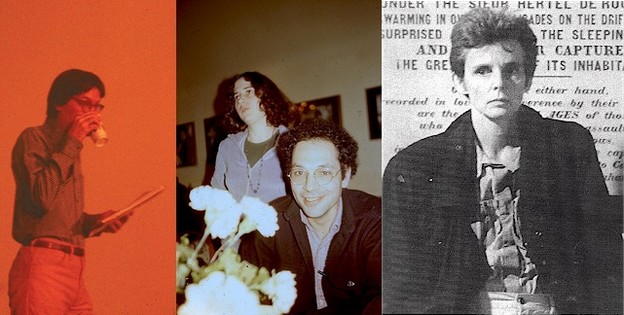Bruce Andrews, Charles Bernstein, Susan Howe, 1979

Bruce Andrews and Charles Bernstein’s interview with Susan Howe captures their early poems and thinking about Language writing poetics: L=A=N=G=U=A=G=E was just over a year old with Number 7 to be published that month. I will investigate this formative moment for the ideas that continue to be crucial, that were effaced, and that enter into productive crisis in the present.
Bruce Andrews and Charles Bernstein
Susan Howe’s WBAI-Pacifica radio show, New York City, March 14, 1979
Full Program:
Bruce Andrews, from R + B (R + B, 1981)
Bruce Andrews, How (Wobbling, 1981)
Interview
Charles Bernstein, Matters of Policy (Controlling Interests, 1980)
Edited transcript published in L=A=N=G=U=A=G=E, Supplement No. 3, October 1981.
Andrews and Bernstein sketch the by-now-familiar program of Language writing, an invocation of writing’s “modernist project […] an exploration of the intrinsic qualities of the media […] which from our point of view is language […] not some concocted verse tradition […] through academic discourse and […] book reviewers in The New York Times.” The “repression of knowledge” through such academic and publishing institutions contributes to a deficiency in “people’s awareness of what poetry and what other writing forms there are.” In addition, Andrews and Bernstein interrogate the very idea of genre in writing and propose “less intrinsic reasons for [the novel, philosophy, and poetry to be] separate than for music to be thought of as separate from painting or painting from writing.”
Bernstein muses on the differences between poetry and painting that result in painting’s greater public interest. He brings up Jackson Pollock’s popularity as stemming from “the fact that his paintings sold for a lot of money” and society’s “certain kind of consumption of art” of “[getting] a little snapshot or postcard of it and […] [consuming] the image.” One consumes the painting’s material image as much as one’s self-image of enjoying capital-intensive art. Bernstein contrasts poetry visually, stating that “poetry is much harder to consume at that level. It’s real hard to get a sense of what a poem is. There’s not really an image […] it looks the same as the way poetry’s always looked, with stanzas and so on, or it looks like words scattered on the page” because “poetry […] is very difficult to understand […] you have to spend time with it.” Bernstein is correct about painting’s popularity being related to its mechanical reproduction that does not annihilate the consumption of one’s self-image, but wrong or at best incomplete in the essentialist conclusions that poetry has to be difficult to understand and has always appeared as stanzas or scattered words. Of many possible counter examples, there are innumerable oral poetries that do not appear as such, and the work of Bruce Andrews, who suggested in “Text and Context” published two years prior, “There is nothing to decipher. / There is nothing to explain.” There is nothing difficult to understand about R + B in vacuo, which begins the radio show, an example of his atomized signifier chain technique that he’s continually used and developed since the beginning of his work: there is only the visceral play of the experiencing intellect.
Andrews and Bernstein’s interest in language concerns empowering the experiencer “to think of writing as practice within the system [of language] […] displaying that system, problematicizing, and making it look like something that’s developed historically, that you don’t have to take for granted” to resist “[thinking] of the system as this apparatus of social control that we’re all going to be subjected to all the time,” and to use “writing in the way it uses language as a paradigm for how people can operate within this larger social system […] [to] come to a greater understanding of how those systems operate and how change within those systems can operate, whether it’s language or whether it’s neighborhood insurrection.” During this formative theoretical moment, this “political dimension […] is going to be undercut […] by demands for the work to take on more obvious or visible so-called political content ‘cause so-called political writers or political poets tend to be ones that do take for granted those larger systems and structures in which language operates.” Andrews and Bernstein therefore promote a non-instrumental poetry “to some degree not mediated to as great an extent by alienation […] some bit of wholeness […] that isn’t completely permeated by the structures of alienation.” Poems are autonomous fields and poetics produce political significance as semiotic scaffoldings to the poems. This groundbreaking desuturing of poems and poetics within the integrated medium of writing proposed by Language writing enabled radical developments in both fields, a relation most recently strongly redeployed by the poems and poetics of Conceptual writing, ironically as its poetics declare an paradigmatic break with Language writing as a final modernism.
Andrews and Bernstein would soon have firmly established the political tenets of Language writing poetics, publishing L=A=N=G=U=A=G=E 9/10, “The Politics of Poetry” double issue, in October 1979, and from their foundations of non-instrumental self-valorizing autonomous aesthetics enriched with philosophemes from collapsed genres, started to rupture greater social address into their poems, such as Andrews’ inclination to insult and Bernstein’s to humor. In the success of their program, it is interesting how formerly primary concerns toward “neighborhood insurrection” and social action were effaced next to the production of many powerful aesthetic works, and how the conception of freely circulating language between social genres encounters contemporary theories such as Alain Badiou’s insistence of a desuturing between philosophy and poetry, their collapse constituting a reneging on the possibility of truth. As Andrews and Bernstein’s intervention was based on their moment’s cultural conditions, seriously repeating their incomplete formative impulses now necessarily requires a confrontation with their achievements.
Next Sunday: Andrews, Bernstein and Ron Silliman in conversation, Bernstein’s apartment, New York City, March 6, 1981, and Andrews, Bernstein, Ray DiPalma and Silliman reading from LEGEND, Andrews’ apartment, New York City, March 10, 1981.
PennSound & Politics